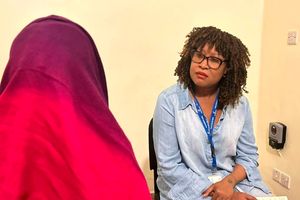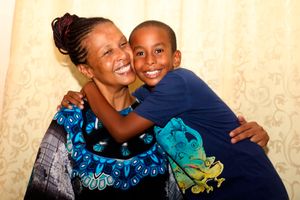
IVF has been the subject of great debate among Christians.
Edna Wairimu* had always wanted to be a mother, but owing to medical issues, she was unable to have a baby conventionally. She opted for an assisted reproductive option.
She was single and wanted to become a parent without what she calls ‘relationship drama’.
Wairimu chose to work with a clinic in Europe to obtain the necessary genetic material, which would be used to create embryos raised from her ova, which she had frozen in her 20s.
The clinic organised the probable candidates based on their IQ or intelligence quotient and physical features, making it easy for Wairimu to decide on the ideal candidate.
After selecting the preferred genetic material, it was flown to Kenya, where she worked with her In vitro fertilisation (IVF) specialist and embryologist to develop viable embryos that were placed in her womb.
“When going through IVF process, the body has to be prepped so it can accommodate the embryo, otherwise you will have a miscarriage,” she says, adding, “This process is arduous and the chances of a miscarriage are at 50 percent. That means one needs to be emotionally prepared for the worst-case scenario.”
According to Wairimu, this is the most expensive aspect of assisted reproductive health since it is psychologically draining and heartbreaking, thus it comes down to how much one wants to be a mother and how perseverant one is.
“Most people abandon the procedure, partly due to the high cost of assisted reproductive health processes, but primarily due to the psychological suffering connected with them.”
Fortunately, she says, she did not have any pastor or a religious leader lecturing her on the sinfulness or lack thereof in her actions.
While Wairimu did not weigh religion or church specifically to bear in her decision to have her baby, that was not the case for Christine*.
A successful career woman, Christine was also serving in her church in Nairobi city. With no husband in sight and feeling her biological clock ticking, Christine decided to take matters into her own hands.
She underwent IVF and months later, she turned up in church pregnant.
Owing to the ethical issues that IVF presents, she became a pariah in church, a place that was once a safe haven for her.
The church leadership informed her that her actions contravened the church’s laws and was consequently suspended, with excommunication most likely to follow.
That was a huge price she paid for her ‘sins’. But interestingly, unlike the Kenyan society, abroad, IVF and religion there is a shift that is happening.
For Edna and Christine, in the US, the Supreme Court in the state of Alabama made a landmark ruling on IVF that is likely to have serious ramifications on the entire practice.
Religion News Service reported that “The fate of frozen embryos has been the subject of fierce debate in recent weeks after the Alabama Supreme Court ruled that embryos are “extra-uterine children” and protected by the State’s wrongful death law.”
Quoting the Holy Book, Alabama Chief Justice Tom Parker stated that embryos “cannot be wrongfully destroyed without incurring the wrath of a holy God, who views the destruction of His image as an affront to Himself.”
After the ruling, almost all IVF procedures in Alabama were put on pause as fertility clinics tried to sort out the implications of the ruling.
Whether IVF is acceptable for Christians or not has been an issue of great debate among believers for many years.
On a page titled ‘IVF and Christianity, the organisation IVF Worldwide states that the attitude toward reproductive practice varies among Christian groups.
While assisted reproduction is not accepted by the Vatican, it may be practised by Protestant, Anglican and other denominations, it says.
According to traditional Christian views, beginning at conception, the embryo has moral status as a human being, and thus most assisted reproductive technologies are forbidden.

The Vatican has had a clear position against assisted reproduction.
The Vatican has a clear position against assisted reproduction, ever since 1956, Pope Pius XII, defined artificial fecundation as immoral and illegal, because it affects human lives by separating procreation and sexual normal function.
Modern medical techniques used in assisted reproduction like IVF, embryo transfer, surrogate mothers and embryo cryopreservation are not accepted by the Catholic Church.
The Catholic Church offers its protection to the human being starting with its first seconds of existence: It considers the zygote as a person and strongly disapproves of research on any type of human embryo.
The Eastern Orthodox Church allows medical and surgical treatment of infertility but it is against IVF, assisted reproductive technologies, surrogacy, donor sperm insemination and embryo donation.
Protestant churches accept the traditional treatment of infertility. Assisted reproductive technologies are partially accepted only when the gametes are from married couples and when the procedure avoids damage to the pre-embryo.
Sperm donation and oocyte donation are prohibited. The Anglican Church is more liberal on the use of IVF/ET and allows semen collection by masturbation for artificial insemination by the husband for IVF.
But it forbids the use of gamete donor, semen and oocyte from a third party. Gamete donation and surrogacy are prohibited.
Bishop Calisto Odede, the Presiding Bishop of Christ in the Answer Ministries (CITAM) acknowledges that technology has made it possible for couples who hitherto were unable, to have children.
He however warns of the many pitfalls that come with that technology.
“We certainly affirm the truth that, 'Children are a blessing and a gift from the Lord' as recorded in Psalms127:3. This is because it is the Lord who gives life as the writer of the Psalms says 'For you created my inmost being; you knit me together in my mother’s womb' (Psalms139:13).”
Bishop Odede continues, “Yet at the same time we also acknowledge that through scientific means, many married wives have been enabled to have the joy of becoming mothers ...”
He however warns that the technology might be misused by those in same-sex relationships to get children, thus sabotaging the will of God that marriage is strictly between male and female.
“The desire to have genetical connections with the baby has led many to abandon the more widely acceptable adoption and get into these new scientific methods. The church has often raised concern in those areas where there is an infringement on ethical values and biblical principles.”
Concern has also been raised because some of the methods used have also been used by those who are opposed to traditional family, where couples of same sex-marriages try to get children, notes Bishop Odede.
According to the bishop, a Christian who goes for IVF should not be excommunicated but be walked through a process of repentance and restoration.
If they have declined church discipline and see no wrong at all in what they have done, then the Bible would recommend that they be treated as non-believers, he adds.
“Since Christians believe that life begins at conception, couples going for assisted pregnancy should also take care that it does not lead to termination of unwanted embryos as this would be similar to abortion,” Odede says.
Reverend Zeinab Hassan of Latter Glory Church agrees with Bishop Odede that excommunication should not be the punishment in a case where a church member goes for IVF.
“As a pastor, I wouldn’t have kicked her out but I would stop her from serving and still show her love. We fall short of God’s glory every day, we all do it differently so she should be understood but disciplined as well,” she says.
Pastor Hassan is however categorical that a thorough investigation be carried out to establish whether the pregnancy was a result of IVF or fornication.
“She might have fallen into temptation then the baby came, and since she couldn’t have aborted because that is another sin, maybe she decided to lie for a cover-up. Nevertheless, the church should have a space for this kind of people. We all sin but we do it differently.”










